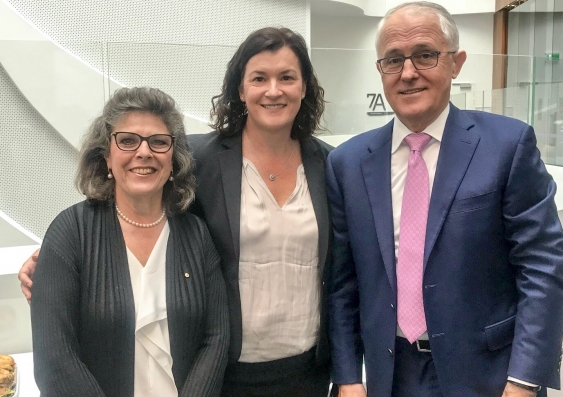Prime Minister announces $5m funding boost for brain cancer personalised trials
A world-leading personalised medicine program will be available to children with high risk brain cancer following new funding for the Zero Childhood Cancer program.
A world-leading personalised medicine program will be available to children with high risk brain cancer following new funding for the Zero Childhood Cancer program.

Prime Minister Malcom Turnbull and Federal Health Minister Greg Hunt yesterday announced $5 million in funding from the Medical Research Future Fund for the Zero Childhood Cancer brain cancer program, a national initiative led by the Children’s Cancer Institute based at UNSW's Lowy Cancer Research Centre.
Brain tumours are the most common solid tumour of childhood, and one of the leading causes of death in Australian children aged under 14. Recent statistics suggest 4 out of 10 children with aggressive brain cancer will die of their disease.
The Zero Childhood Cancer personalised medicine program is the largest single initiative ever undertaken for children with cancer in Australia, and is led by the Children’s Cancer Institute in partnership with the Kids Cancer Centre at Sydney Children’s Hospital, Randwick.
The program is designed to fast-track children with high risk brain cancer into treatment with new drugs specifically tailored for their unique disease.
Professor Michelle Haber AM, Executive Director of the Children’s Cancer Institute and UNSW Conjoint Professor, who spoke at the announcement in Melbourne, said the Zero program “recognises that every child’s cancer is unique, so to improve survival rates the precise molecular and biological profile of each child’s cancer needs to be identified using complex laboratory tests to enable recommendation of an individual personalised treatment plan”.
The national Zero Childhood Cancer clinical trial opened last September involving all eight children’s hospitals in Australia with more than 400 children with high risk cancer expected to participate over the next three years. Since starting the pilot study, almost half of all the patients involved in the program are children with aggressive brain cancer.
The $5 million in funding will help to:
At the announcement, the Prime Minister said that the funding, which is part of a broader $100 million Australian Brain Cancer Mission, will mean more than 200 children – around 50 every year – with high risk brain cancer will now be included in the program across Australia.
“This is about giving each and every child the best possible chance at a better life,” Mr Turnbull said.
The funding is one of the first to be announced from the Medical Research Future Fund and is the first for the Brain Cancer Mission Fund.
The Zero Childhood Cancer Program is a national initiative of the Children’s Cancer Institute and The Sydney Children’s Hospitals Network. The program is led by scientists and clinicians from the Children’s Cancer Institute and Sydney Children’s Hospital, Randwick and is one of the most exciting childhood cancer research initiatives ever undertaken in Australia, to tackle the most serious cases of infant, childhood and adolescent cancer. The clinical trial is open in Sydney with other cities set to open in a staged roll-out over coming months.